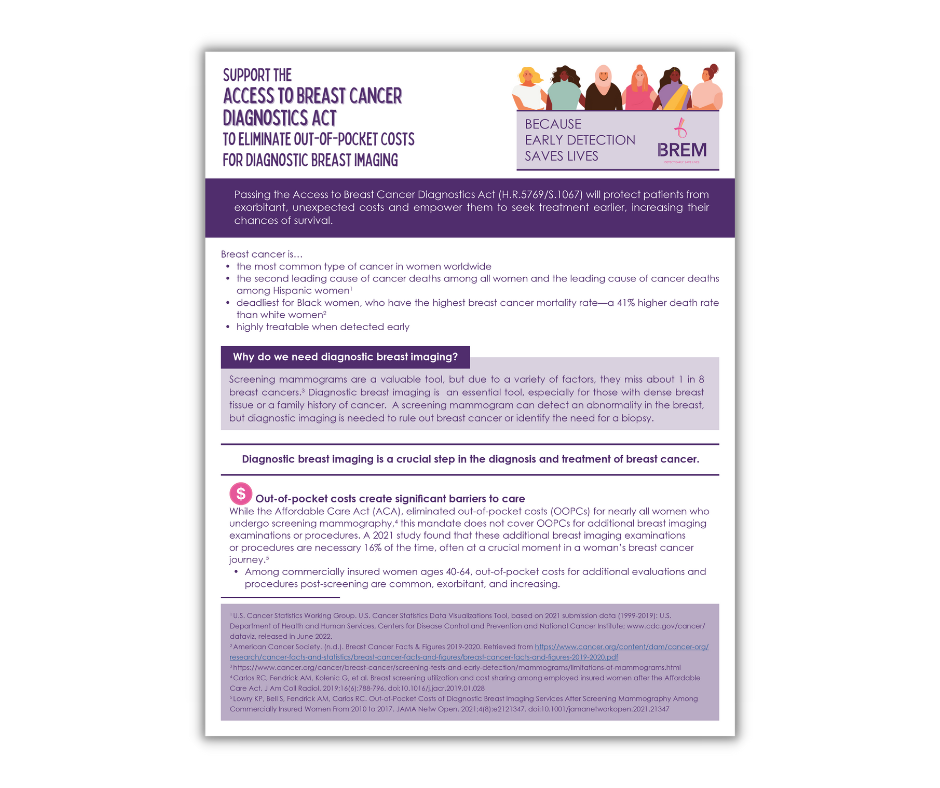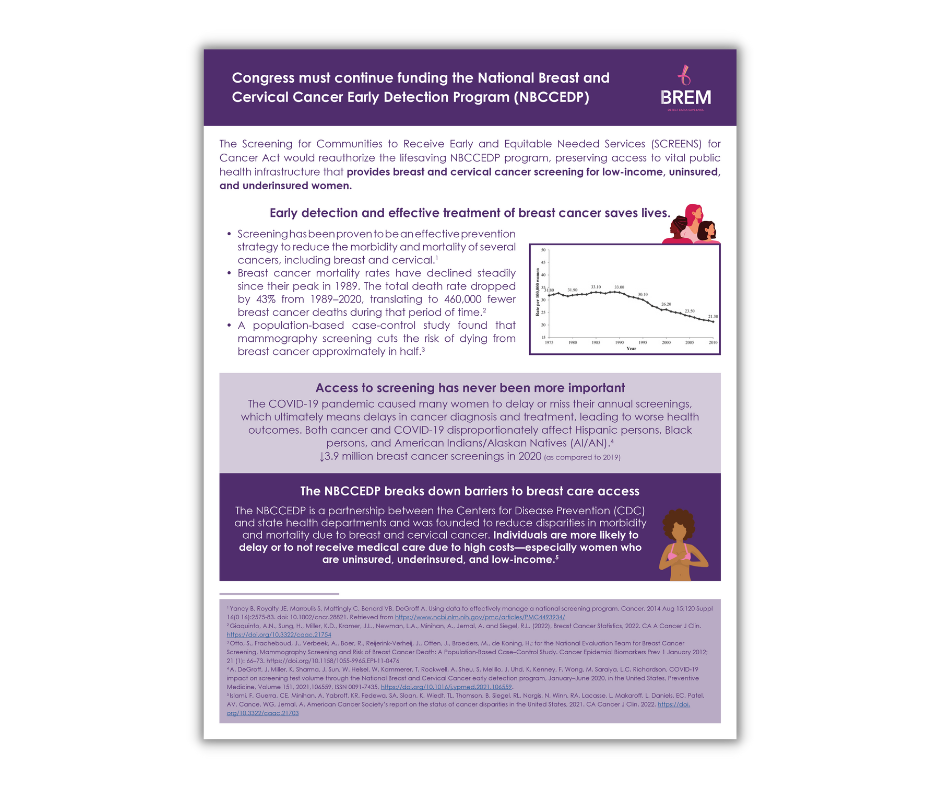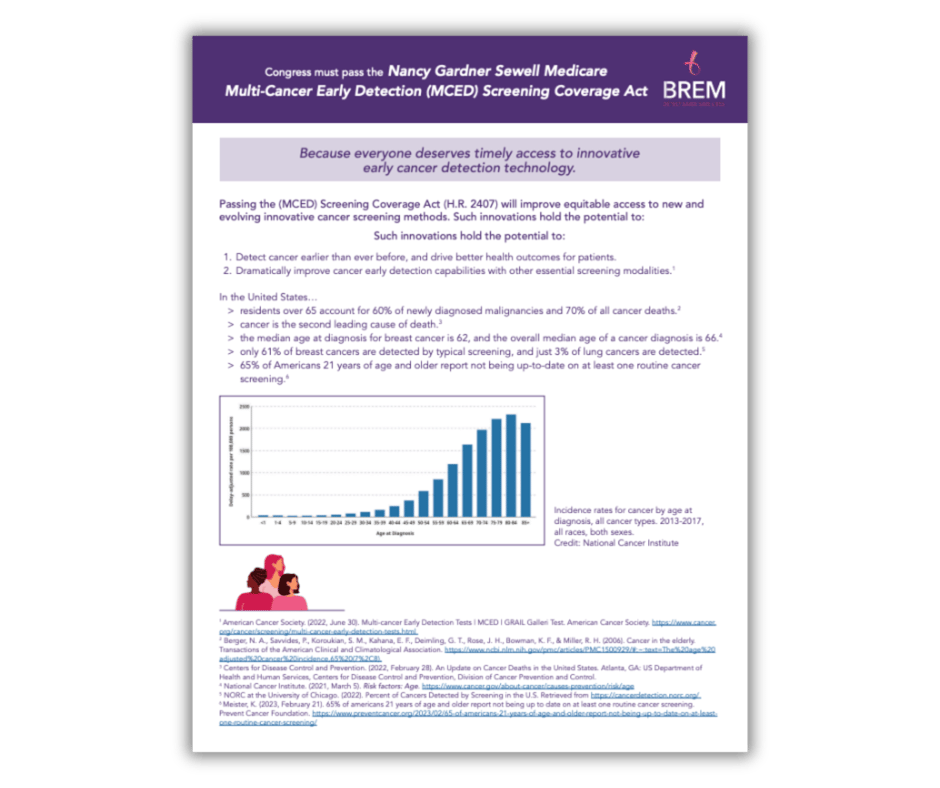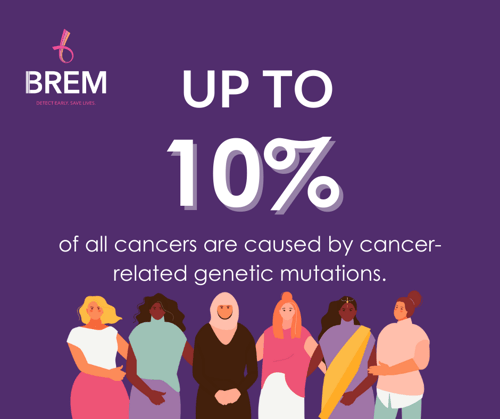DRIVING POLICY CHANGE TO PROTECT
WOMEN’S BREAST HEALTH
Take Action.
Demand Access.
Learn more about current legislation that impacts women's access to equitable breast healthcare and take action to drive change
Early detection of breast cancer saves lives. At the Brem Foundation, our priority is ensuring early detection is a priority for lawmakers. Click the infographic below to see how we advocate for quality, equitable breast healthcare at the federal level.
Learn How We Advocate:
Get the Infographic
Click the image below to access!
Ready to Take Action?
Learn about the specific policy issues and bills we're championing!
Eliminate out-of-pocket costs for diagnostic breast imaging
The Access to Breast Cancer Diagnostics (ABCD) Act, would protect patients from exorbitant, unexpected costs and empower them to seek treatment earlier, increasing their chances of survival.
Ready to make your voice heard? We've made it easy to contact your state representative by emailing or sharing with them on Twitter (Don't worry - we'll give you the exact words to use!)


help low-income, uninsured, and underinsured women access critical breast care
Since 1991, the National Breast and Cervical Cancer Early Detection Program (NBCCEDP) has served more than 6 million women, detecting nearly 74,000 invasive breast cancers and over 23,000 premalignant breast lesions. However, if the Screening for Communities to Receive Early and Equitable Needed Services (SCREENS) for Cancer Act is not passed, this program will end, and millions of women from underserved communities will lose access to the preventive screening and treatments that save lives.
Want to take action now? You can create meaningful change by contacting your state representative and using your voice to advocate for those in need. We've made it easy - click below to get started!
INSURERS MUST COVER BREAST SCREENING AND DIAGNOSTICS WITH NO COST-SHARING
The Find It Early Act will ensure that women never have to compromise their breast health—or their lives—because they cannot afford preventive breast care.
Download our fact sheet to see how this legislation could eliminate the "hidden costs" of a breast cancer diagnosis.
Want to lend your voice to this cause? We've made it easy to contact your state representative by emailing or sharing with them on Twitter (Don't worry - we'll give you the exact words to use!)
.png?width=940&height=788&name=Thumbnails%20(1).png)

CHAMPION INCREASED ACCESS TO LIFESAVING MULTI-CANCER EARLY DETECTION SCREENING TESTS
Passing the Nancy Gardner Sewell Medicare Multi-Cancer Early Detection (MCED) Screening Coverage Act will improve future equitable access to new and innovative cancer screening methods. Innovative blood tests - otherwise known as liquid biopsy - hold the potential to detect cancer earlier than ever before, while dramatically improving cancer detection capabilities.
Download our fact sheet to learn how this legislation could improve the quality of life for millions of American cancer patients.
Want to help advocate for the MCED Screening Coverage Act? Let your Congressional representatives know that they must do more to ensure that all seniors with Medicare have access to lifesaving, multi-cancer early detection screenings - get started below!
ENSURE ALL INDIVIDUALS WITH GENETIC RISKS FOR HEREDITARY CANCERS RECEIVE IMPROVED ACCESS TO EXPANDED COVERAGE
Up to 10% of all cancers are caused by cancer-related genetic mutations.
The Reducing Hereditary Cancer Act (RHCA) aims to provide expanded coverage for at-risk Medicare beneficiary individuals, particularly those with genetic risks for hereditary cancers, and addresses a pressing need for increased access to genetic counseling, testing, cancer screening, and preventive care.
Help us champion the Reducing Hereditary Cancer Act. Contact your elected representatives and express your support for the act—urge them to prioritize this vital legislation to improve access for at-risk individuals.

Federal Legislation: The Mammography Quality Standards Act
Thirty-eight states and the District of Columbia require some notification to women who receive mammograms about breast density, but that is not enough. In March of 2019, the U.S. Food and Drug Administration (FDA) proposed amendments and updates to the Mammography Quality Standards Act (MQSA). This amendment was intended to “modernize breast cancer screening and help empower patients with information when they are considering important decisions regarding their breast health care.” Part of this proposal includes standardized notification of breast density levels in all mammography reports across the U.S.
*Note: Nothing in the rule prohibits states from enacting breast-density notification laws that are at least as stringent as those in the federal rule.
ACTION NEEDED
Brem calls upon the FDA to issue a final rule governing breast density notification across the United States as soon as possible. This will allow for all women who undergo breast cancer screening to have necessary information about breast density to have a more informed conversation with her provider about potential essential screening options.
.png)
.jpeg)
DC Breast Density Notification Law
The Brem Foundation drafted and helped pass D.C.’s first-ever breast density law. The Dense Breast Screening and Notification Act of 2018 (D.C. Law 22-26) was unanimously passed at the end of 2018 and became effective on March 22, 2019. The law requires health care facilities to include mammography results, including patients' breast tissue classification. This law also requires insurance coverage for the essential screenings that women with dense breasts, and other risk factors, need beyond just mammograms. To view the text of the law click here.
SIGN UP FOR THE BREM NEWSLETTER
Get on our list! Fill out this form
Stay up to date on early detection of breast cancer!
Our team regularly puts together informative and educational newsletters, full of practical, actionable advice so you can advocate for lifesaving breast cancer screenings.













